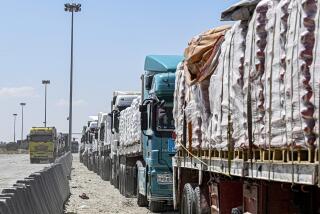Cambodia Talks Deadlock; Fighting May Resume : Indochina: Khmer Rouge leader blames Vietnam-installed government. But most Western observers say the radical group is most responsible.
- Share via
BEIJING — International talks on Cambodia ended in deadlock here Sunday, with apparently growing prospects of a renewed civil war in that long-suffering nation.
Khieu Samphan, a leader of the radical Khmer Rouge, which ruled Cambodia in a bloody reign of terror from 1975 through 1978, predicted at a Sunday news conference that fighting will soon resume between Khmer Rouge guerrilla forces and the army of the Vietnamese-installed Phnom Penh government.
Khieu Samphan sought to pin blame for any renewed warfare on the Phnom Penh side. But most Western observers believe it is the Khmer Rouge that is primarily responsible for blocking full implementation of a U.N.-sponsored peace accord signed in Paris last year.
“The Vietnamese forces and their puppets are preparing to launch attacks against our forces, yet they accuse us of preparing to launch an offensive,” Khieu Samphan declared. “Here I would like to stress that as victims we have the right to self-defense. . . . This is a very dangerous situation.”
The Khmer Rouge portrays itself as victimized because it was ousted from power in a late-1978 invasion by Vietnam. But under its brutal rule, an estimated 1 million Cambodians died of starvation, disease and political killings.
Failure of this weekend’s talks means that the international community and the other Cambodian factions must consider whether to move forward with elections in Cambodia next spring without Khmer Rouge participation. Also at issue is whether to impose U.N. economic sanctions against the Khmer Rouge. Such sanctions would largely be aimed at cutting the Khmer Rouge off from lucrative cross-border trade with Thailand.
If both these steps are taken, the eventual result could be creation of a new Phnom Penh government enjoying broad international support but facing a drawn-out struggle against jungle-based Khmer Rouge forces.
While not spoken of in such detail in Beijing on Sunday, this basic scenario was hinted at by Cambodian leader Prince Norodom Sihanouk in Bangkok in September.
“What is left to us is the only solution--to organize the election . . . and put aside the Khmer Rouge,” Sihanouk said at that time. He said Khmer Rouge guerrillas could be left in the areas they control “to live their own lives.”
French Foreign Minister Roland Dumas and Indonesian Foreign Minister Ali Alatas, co-hosts of this weekend’s two-day conference in Beijing, blamed the Khmer Rouge for the failure of the talks. “It is true, of course, that the Khmer Rouge party is hostile to the continuation of the peace process,” Dumas said at a midday news conference Sunday.
Participating in the Beijing talks were leaders of the four Cambodian factions, the head of the U.N. peacekeeping force in Cambodia and envoys from the United States, Russia, China, France, Britain, Germany, Japan, Indonesia, Thailand and Australia. Sihanouk, head of the Supreme National Council, an umbrella grouping of the rival Cambodian factions, also attended.
Dumas and Alatas said they will soon present new proposals to the U.N. Security Council based partly on the discussions held here. “Some of these might be measures of constraint,” Dumas said.
Alatas, commenting that “time is running out on the implementation of the Paris accords,” said that the Security Council is scheduled to meet Nov. 15 or 16 to consider their proposals.
“Now that we have not been able to overcome the difficulties, it is clear that in trying to realize the fundamental objectives of the Paris agreement, some appropriate adjustments need to be made,” Alatas said. “At this rather serious stage of development, the foremost thing we ought to ensure is that the situation in Cambodia does not relapse into renewed fighting on a large scale and renewed armed struggle.”
Alatas and Dumas provided no details on what specific measures they would propose in terms of “constraints” and “adjustments.” But these terms appeared to include reference to the issues of sanctions and how to hold elections.
Khieu Samphan, at his news conference, repeated two key demands of the Khmer Rouge as preconditions for its participation in the partial disarmament of all factions and in the scheduled spring elections, two of the most basic provisions of the Paris accords.
One demand is verification that all Vietnamese troops have left Cambodia. Hanoi claims to have already withdrawn all its troops. The U.N. Transitional Authority in Cambodia (UNTAC) says it has no evidence that any Vietnamese soldiers remain. But the Khmer Rouge insists that many Vietnamese troops, some disguised as civilians, are still in the country.
The other key Khmer Rouge demand is the dismantling of the Vietnamese-installed Cambodian government of Premier Hun Sen. The Paris accords call for transfer of political authority during the pre-election period to the joint control of UNTAC and the Supreme National Council. Khieu Samphan complained that the Supreme National Council remains “an empty shell,” with real authority still in the hands of Hun Sen’s administration.
Many Western observers believe the Khmer Rouge is making these demands largely in order to have an excuse to refuse to disarm, hoping that at some future date it can achieve power through a mix of fighting and political maneuvering. Dumas and Alatas responded to the Khmer Rouge arguments by issuing a written statement that said no faction could use grievances about implementation of the accords to evade its own obligations.
More to Read
Sign up for Essential California
The most important California stories and recommendations in your inbox every morning.
You may occasionally receive promotional content from the Los Angeles Times.













